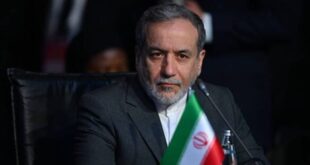 TEHRAN (FNA)- Republican John McCain and Democrat Barack Obama accused one another of glaring errors over Iran, Iraq and the US economy in their first presidential debate.
TEHRAN (FNA)- Republican John McCain and Democrat Barack Obama accused one another of glaring errors over Iran, Iraq and the US economy in their first presidential debate.
Obama, 47, promised to end the “failed” policies of the Bush administration, which he blamed McCain for supporting. McCain, 72, presented himself as a reformer.
The most intense exchanges of the first half of the debate came over Iraq, as Obama claimed credit for opposing the war in the first place, and McCain said he had been instrumental in pushing the successful surge strategy.
“We are winning in Iraq and we’ll come home. And we’ll come home as we have when we have won other wars and not in defeat,” McCain said, warning defeat in Iraq would embolden Al-Qaeda and Iran.
But Obama shot back, saying “six years ago I stood up and opposed this war,” condemning McCain for standing with Bush over 2003 US-led invasion to topple dictator Saddam Hussein. “I wish I had been wrong for the sake of the country and they had been right but that’s not the case,” Obama noted.
And he accused his rival of a catalogue of miscalculations on Iraq. “When the war started you said it was quick and easy, you said we knew where the weapons of mass destruction were. You were wrong.
“You said that we were going to be greeted as liberators. You were wrong. You said that there was no history of violence between Shiite and Sunni and you were wrong.”
Although the Democratic and Republican presidential nominees seemed to agree that more sanctions are needed against Iran over its nuclear program, they had what McCain called ‘a fundamental difference of opinion’ on talking with Iranian leaders without preconditions.
During the Friday night debate, McCain said engaging in direct talk with the Iranian President Mahmoud Ahmadinejad without preconditions would ‘legitimize’ his position toward Israel.
“Here is Ahmadinejad, who is … talking about the extermination of the state of Israel, of wiping Israel off the map, and we’re going to sit down, without precondition, across the table, to legitimize and give (him) a propaganda platform,” said McCain, maneuvering on the 2005 Ahmadinejad quote, which Iran has repeatedly called a ‘mistranslation’.
Obama, however, argued that other than pushing for more sanctions against the country, it is necessary for the US ‘to engage in tough, direct diplomacy with Iran’. Obama said the US should not expect to solve every problem before initiating talks.
“This is a major difference that I have with Senator McCain. This notion that by not talking to people we are punishing them has not worked,” he explained.
“(A meeting without pre-conditions) doesn’t mean you invite them over for tea one day. What it means is we don’t do what we’ve been doing, which is to say, until you agree to do exactly what we say, we won’t have direct contacts with you,” said Obama.
Five former US Secretaries of State – Colin Powell, Madeleine Albright, Warren Christopher, James Baker and Henry Kissinger – have said that the next American administration should hold direct and unconditional talks with Tehran over its nuclear activities.
Obama used remarks made by Kissinger, who is now an advisor to McCain, to back up his argument. In earlier comments, Kissinger had said the United States should negotiate with Tehran ‘without setting any conditions’.
“I am using the same words that your advisors use,” said Obama, when McCain accused him of ‘parsing words’.
“My friend doctor Kissinger, who has been my friend for 35 years, would be interested to hear this conversation… I guarantee you he would not say that presidential top level… Senator Obama is parsing words when he says precondition means preparation,” said McCain.
During the debate, the democratic presidential nominee also said that tough sanctions against Iran could not be achieved without cooperation from Russia and China.
“We do need tougher sanctions. I do not agree with Senator McCain that we are going to be able to execute the kind of sanctions we need without some cooperation from countries like Russia and China… (that) have extensive trade with Iran,” said Obama.
Obama’s comments came on the same day that the UN Security Council reaffirmed its previous stance toward the Iranian nuclear program, not imposing a new round of sanctions on a state that has signed the nuclear Non-Proliferation Treaty, allowed an unprecedented number of UN nuclear watchdog inspections and rejected allegations of seeking nuclear arms.
US failure to bring about a consensus against Iran at the UN Security Council came after Russia announced its opposition to a new resolution against Iran and China said that it favored dialogue on the issue.
 Eurasia Press & News
Eurasia Press & News



